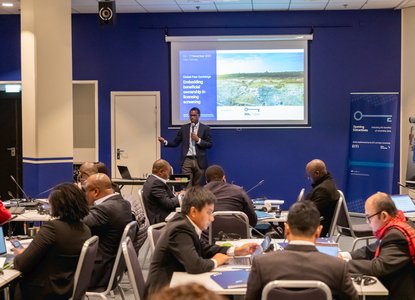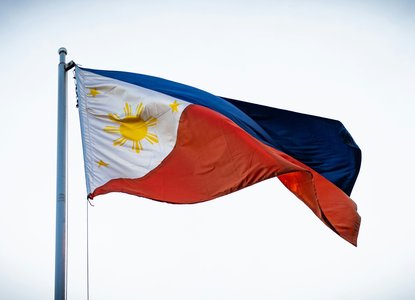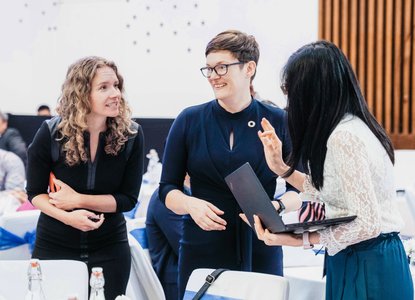The Nigerian Data Challenge – two examples of how public access and data quality influence investigations
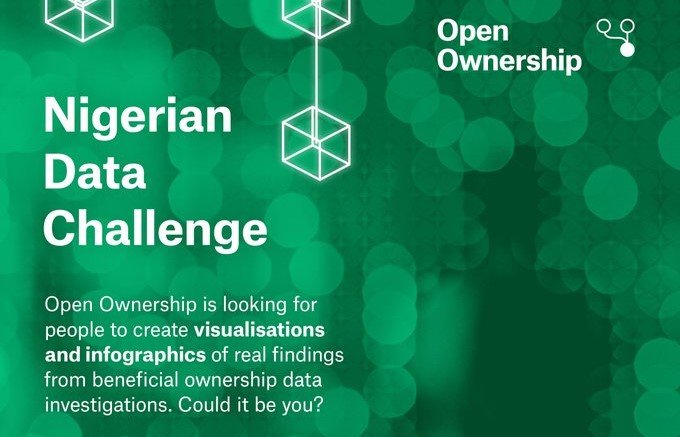
As part of our Nigerian Data Challenge, Zeke Hunter-Green, software engineer at The Guardian Newspaper, analysed properties in England and Wales owned by Nigerian people via overseas corporate entities. And Boris Kusovski, Director of Financial Markets Strategy at Senzing Inc. looked into Aluminium Smelter Company Co. LTD (also known as ALSCON), a manufacturer of aluminium products which is based in Lagos, Nigeria, and generally considered as a state-owned company. This blogpost will explore their methods, analysis and findings, and discuss how important publicly-available data was to their work.
Example 1: Nigerians owning land in the United Kingdom
Zeke Hunter-Green used two of the required data sources, the Register of Overseas Entities spreadsheet published by Open Ownership using United Kingdom data, and Joining the Dots with Politically Exposed Persons platform. He combined these with the UK Land Registry’s Overseas companies that own property in England and Wales dataset, followed by simple Google searches to find descriptions of some beneficial owners, in order to find the Nigerian nationals owning the most land in the UK via overseas entities.
Exploring the top 10 Nigerians owning land in the UK, by value
Hunter-Green first created a simple infographic listing the top 10 Nigerian citizens with UK land ownership, including their company and job title, ordered by the current value of their land holdings.
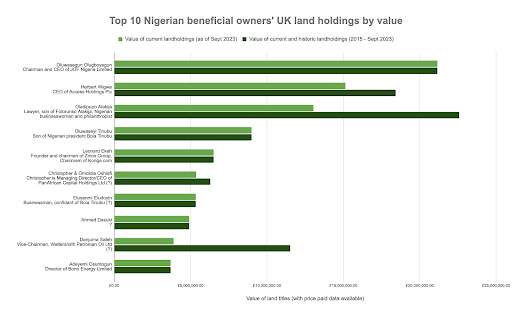
Top 10 Nigerians owning land in the UK, by number of land titles
He then ordered the same list by the number of land titles each person has, identifying oil business owners and bank investors as some of the biggest owners of land titles. This second graph shows us that for a number of reasons, a significant number of land titles do not have price data associated with them. This in turn makes it clear that the first graph (above) is a very incomplete account of the true value of these landholdings. There are a few reasons why price data might be missing: the Land Registry doesn’t have price data for titles transferred or bought before 1995, when it was the sale of shares in a property, or the sale of right-to-buy properties.
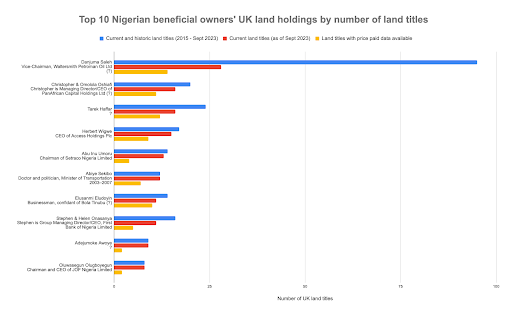
Nigerian politically exposed persons (PEPs) owning land titles in the UK
Hunter-Green finally compared this same list with PEPs listed in the Joining the Dots platform and via Google searches to find politically exposed landowners. This data shows that three individuals identified as high-level Nigerian politicians in the Joining the Dots platform, the governor of Abia State, the Minister of Industry and the Minister of Information, appear to own properties in the UK via overseas entities. His investigation shows just what can be achieved by cross-matching sources.
Example 2: Russian connections to a Nigerian enterprise
At the same time, as part of our Nigerian Data Challenge, Boris Kusovski, Director of Financial Markets Strategy at Senzing Inc. looked into the Nigerian state-owned enterprise (SOE) Aluminium Smelter Company Co. LTD (also known as ALSCON). It is a manufacturer of aluminium products which is based in Lagos, Nigeria. It is generally registered as a state-owned company on databases such as Factiva, the Dow Jones database, and when it was incorporated in 1989, his research found it was a joint venture project between the Nigerian government and two foreign technical partners, Ferrostaal AG of Germany and Reynolds International Inc. registered in the United States.
Kusovski used two of the required sources, the Open Ownership Register and Nigeria Extractive Industries Transparency Initiative’s beneficial ownership database, and combined these with the International Consortium of Investigative Journalism (ICIJ) Offshore Leaks Database and additional watch-list data from the Dow Jones Watchlist, since the Joining the Dots with Politically Exposed Persons platform database only had domestic PEPs. This enabled him to identify information that suggests internationally-sanctioned Russian individuals may be beneficial owners of ALSCON.
Initially, Kusovski found that ALSCON is listed as a state-owned company on the Nigeria EITI’s beneficial ownership database portal, owned by the Nigerian government, However, a look at the ICIJ Leaks Database, and additional watch list data provided him with further information: it appears that ALSCON is 15% owned by the government of Nigeria and the remainder by United Company Rusal PLC, which is majority owned by EN+ Group PLC. Both these companies are registered in Russia.
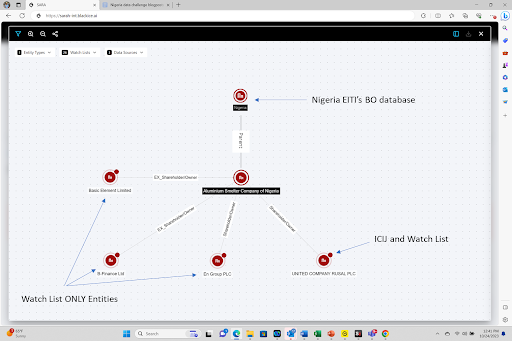
Screenshot of ALSCON’s beneficial owners from the Black Ice platform
Methods and sources
Boris Kusovski used data from:
- Open Ownership Register and
- Nigeria Extractive Industries Transparency Initiative’s beneficial ownership database, and
- combined these with the International Consortium of Investigative Journalism (ICIJ) Offshore Leaks Database and
- additional watch-list data from the Dow Jones Watchlist.
He told us: “I then used mapping tools from Senzing to load the Dow Jones (OFAC/SDN file) and Open Ownership data in bulk, which was the work of a minute, although I had to manually create Open Corporates records from a search on ALSCON on their website. Once I had resolved the data across the three data sources I was able to validate the results. I went to www.Hoovers.com portal as a second validation step to the Open Corporates data, and then searched the Nigerian Persons with Significant Control Register to verify the data. Screening against adverse media articles from many public sources was the final confirmation of the validity of my examples.”
Adverse media screening is an important part of customer due diligence undertaken by financial institutions and businesses. It is the process whereby a person or entity is compared to (“screened against”) negative news and data sources.
After this investigative work, Kusovki was able to produce an example of an entity linked across the three public data sources. The data suggests links between a listed Nigerian state-owned company, ALSCON, and a network of ownership including sanctioned entities.
Linking beneficial ownership and sanctions data
Following the above information about ALSCON’s ownership, Kusovski discovered that one of the founders and shareholders of both United Company Rusal PLC and En Group PLC is listed as Oleg Vladimirovich Deripaska, a Russian citizen. According to the data, he also owns a company which owns 100% of United Company Rusal PLC (which owns 85% of ALSCON).
According to the United States’ OFAC, Mr Deripaska appears in the Specially Designated Nationals and Blocked Persons list. He is one of three individuals indicted on 29 September 2022 for conspiring to violate and evade United States’ sanctions, in violation of the International Emergency Economic Powers Act. He was also sanctioned by the UK Foreign and Commonwealth Office and His Majesty's Treasury in March 2022 (after the invasion of Ukraine).
Using the Black Ice portal, Kusovski then visually represented Mr. Deripaska’s current and historic connections with other companies, assets and people.
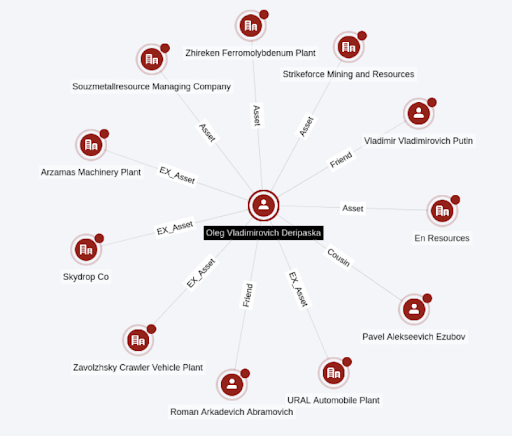
A visual representation of Mr. Deripaska’s current and historic connections with other companies, assets and people.
Note 1: Details on ALSCON, United Company Rusal PLC and their ownership disposition can be found at: Treasury Designates Russian Oligarchs, Officials, and Entities in Response to Worldwide Malign Activity | U.S. Department of the Treasury
Note 2: Annual United Company Rusal PLC report stating their interest in ALSCON can be found at: https://www.annualreports.com/HostedData/AnnualReports/PDF/rusal_2022.pdf
What these examples tell us about access to, and quality of, beneficial ownership data
These two different analyses, by individuals in different countries, were possible thanks to publicly-available BO information. In some cases, it was complemented with data from huge historic leaks (like the Panama papers), and in some cases, verified and extended by data available by paid sources. What is important to note however is that these findings couldn’t have been achieved without information released by governments. The Nigerian Data Challenge aimed to demonstrate the power of using publicly-available BO data, and to encourage transparency and accountability in business ownership. We are delighted to see this so aptly illustrated by these two submissions.
The network analysis shown in the final images by Kusovski demonstrates the potential of linking entities, and finding links between corporate entities and beneficial owners in complex, transnational ownership chains. The Senzing Inc. tool is a paid one, but similar free analysis could be done using OpenScreening, a tool developed by Linkurious that contains BO data from Open Ownership’s register, sanction lists from OpenSanctions and leaked documents from the ICIJ Leaks Database.
One common observation by participants in the Nigerian Data Challenge was the lack of common identifiers to allow comparison of people across multiple sources. Proxies were done to match full names with birth dates, gender and nationality, but sometimes false matches would still emerge. Guidance on name conventions (such as this document from the UK government, or this post from Organised Crime and Corruption Reporting Project) proved to be very helpful in aiding investigators’ work.
The same issue (lack of global identifiers) can hamper searches on companies too. Here at Open Ownership we have recently started collaborating with the Global Legal Entity Identifier Foundation, meaning that Legal Entity Identifiers (LEIs) are now being integrated into datasets produced in line with the Beneficial Ownership Data Standard for the first time. This enables greater connectivity between international beneficial ownership and corporate ownership databases. Open Ownership is the first third party in the world to utilise an existing LEI mapping product to create additional linkage to its data.
This Challenge was run to celebrate Access to Information Day, and we are delighted that these two examples demonstrate the potential for meaningful investigations using quality, publicly-available BO data. Open Ownership continues to work closely with the Nigerian government to support their public BO Register, as well as creating useful tools to improve data analysis and build the capacity of data analysts to embed BO data in their work. If you would like to learn more, please email Agustina De Luca on [email protected].
Related articles and publications
Publication type
Blog post
Country focus
Nigeria
Topics
Open Ownership Register
Sections
Impact,
Technology
Open Ownership Principles
Central register,
Access,
Structured data
